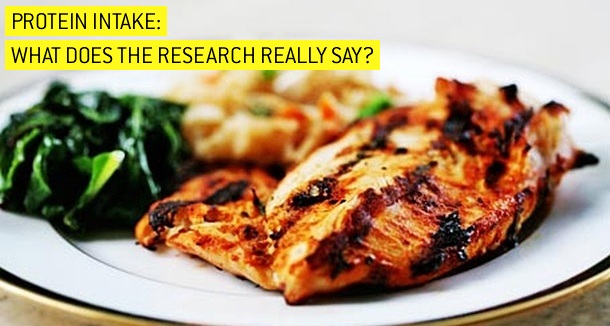Bodybuilders, power lifters, strength and power athletes and certain team sports athletes can greatly benefit from having increased lean body mass in the form of muscle. Hell, for bodybuilders it’s the goal of the sport! While for performance athletes it’s a means to an end.

Total muscle mass, strength and power can benefit athletes in many ways depending on their specific sport, position and needs. Therefore, it is important for athletes to determine what the optimal protein intake is in order to support these needs.
However, there is much debate on the topic of protein intake and often the focus of most protein recommendations are to meet a minimum dietary requirement, versus providing an intake that will result in optimal performance or muscle growth. The issue of safety is also a concern since it is widely claimed that excessive protein intakes can be detrimental to bone, kidney and liver health and can cause dehydration. These lingering fears of the detrimental effects of high protein intakes may be the reason why protein recommendations tend to be overly conservative, despite a number of studies suggesting that higher intakes may be beneficial for performance and lean body mass accrual.
To change this paradigm, it is essential not only to illuminate what is optimal for sports performance and muscle growth, but also to point out that there is little evidence to support the supposed adverse health effects of higher protein diets.
Research On The Safety Of High Protein Diets
If you sit down with most traditional, classically trained dieticians who have not taken courses or specializations in sports or performance nutrition, you will probably be surprised at how vastly different their recommendations are for protein intake compared to what most muscle magazines or bodybuilders would suggest. You would also probably be shocked by the risks associated with high protein intakes that they would inform you of. So who is right, the bodybuilding gurus and champions or the classically trained clinical dietician? The truth, as always, is somewhere in the middle. More often than not, the average person under consumes protein, while the average bodybuilder over consumes it.
But, before I make any definitive statements about how much protein to eat, we should really take a moment to examine safety.
Safety First
 To be a good coach in a broad philosophical sense, a foundation of ethics and care for the well being of one’s athletes must be the cornerstone of all decisions. Much like a coach should not recommend performance enhancing drugs to athletes because of their detrimental health effects, a coach should not suggest high protein intakes (even if they enhance performance) if they actually do carry health risks. But do high dietary protein intakes carry health risks? In a review of 41 studies examining the purported adverse affects of high protein diets in athletes, it was noted that protein intakes of 2.8g/kg did not impair kidney function in the short term (Manninen 2004). In an even more comprehensive review of 111 studies, specifically looking at protein intake and kidney function, it was found that athletes who habitually consumed over 2.0g/kg of protein showed no impairments in renal function (Martin et al, 2005). Another review examining safety concerns of protein for athletes, pointed out that no link between high protein intakes and heart disease could be made (only between excessive fat intake and heart disease). In fact, it was found that high protein intakes when fat was controlled actually reduced the risk of ischemic heart attack.
To be a good coach in a broad philosophical sense, a foundation of ethics and care for the well being of one’s athletes must be the cornerstone of all decisions. Much like a coach should not recommend performance enhancing drugs to athletes because of their detrimental health effects, a coach should not suggest high protein intakes (even if they enhance performance) if they actually do carry health risks. But do high dietary protein intakes carry health risks? In a review of 41 studies examining the purported adverse affects of high protein diets in athletes, it was noted that protein intakes of 2.8g/kg did not impair kidney function in the short term (Manninen 2004). In an even more comprehensive review of 111 studies, specifically looking at protein intake and kidney function, it was found that athletes who habitually consumed over 2.0g/kg of protein showed no impairments in renal function (Martin et al, 2005). Another review examining safety concerns of protein for athletes, pointed out that no link between high protein intakes and heart disease could be made (only between excessive fat intake and heart disease). In fact, it was found that high protein intakes when fat was controlled actually reduced the risk of ischemic heart attack.
It was also concluded that no link between high protein intakes and poor kidney health could be made. In fact, at least one study showed an improvement in kidney function among athletes who consumed high protein diets.
This review also pointed to research that showed a protein intake of 150g had the same effect on calcium balance as an intake of 50g, contrary to the belief that high protein intakes cause calcium leaching. Lastly, it was noted that bodybuilders who habitually consumed more protein than athletes, who habitually consumed more protein than non athletes had no increase in calcium excretion. It is worth mentioning that the bodybuilder group consumed 50% more protein than the athletes, and the athletes consumed significantly more than the non-athlete group (Bradley-Popovicha et al, 2003). A similar review titled “Protein and amino acids for athletes” had the same conclusions (Tipton et al, 2004), as did a more recent review “A Critical Examination of Dietary Protein Requirements, Benefits, and Excesses in Athletes” (Phillips et al, 2007).
So, in light of recent research, it can be said more or less definitively that protein intakes around and slightly above 1g per pound of body weight do not hold the purported health risks, at least for athletes and bodybuilders.
More Findings
In direct studies on non-athlete populations, similar results were found. This implies that neither the physical activity of athletes nor a possible bias held by the review authors is skewing the data. One study showed that there were no detrimental effects on kidney, liver or bone health after one year of consuming protein intakes of 2.2g/kg of lean body mass (Li et al, 2010). Another study showed that a diet consisting of 25% protein with an additional 50g of supplemental protein daily, had no ill effects on health (it also happened to be the best for maintaining a healthy weight after dieting) (Claessens et al, 2009). With such a staggering amount of evidence showing that high protein intakes have very few of the purported health risks, it begs the question: why does the stigma continue to linger?
To answer, it is worth pointing out that the vast majority of this research was published within the last decade and to give credit to progress, protein recommendations for athletes have increased over time, although they still tend to fall short of optimal in most cases based off of the most recent research.

How Much Protein Should We Eat On A Daily Basis?
So I know what you are waiting for, you’re waiting for me to tell you how much protein to eat already! Well, the answer is never cut and dry is it? Let’s talk about what we know, it is clear that the optimal protein intake is higher than some recommendations; in one study it was shown that a protein intake of 2.1g/kg provided superior muscle mass gains to a protein intake of 1.2g/kg in weightlifters (Tipton et al, 2004). It is also known that even in a very slight caloric deficit (~100kcals) while performing high levels of activity, the upper levels of the recommended protein intake for athletes (2.0g/kg) are not always sufficient to maintain nitrogen balance (Manninen 2004). So we know that eating slightly more than the upper level of the generally recommended protein intakes for athletes is better than the low end of the current recommendations. We also know that the current upper level recommendations are precarious with regards to muscle maintenance while on a diet, even if the caloric deficit is very mild. Lastly, it has been shown that intakes as high as 3.0g/kg (or 40% of calories) have no significant health risks (Tipton et al, 2004).
So, not only are the current recommendations suboptimal for weight lifters, and not enough to maintain muscle mass while doing high levels of activity on a diet, but higher intakes seem to have no risks.
How Much Protein Should Be Eaten Per Meal & How Often?
Another important point made in some more recent studies, is that Muscle Protein Synthesis (MPS) is increased in a dose-dependent fashion in response to protein. Therefore, it may be more useful to suggest a per meal protein intake in addition to a daily total. Since maximal muscle growth occurs due to an increase in MPS, it may be optimal to focus not only on total protein intake, but also frequency and amount of protein at each meal. In fact, in the most recent research it has been shown that MPS is maximally stimulated by 3-4g of the branch chain amino acid Leucine (or .05g/kg of Leucine), and that it can only be maximally stimulated every four to six hours. This research is the first of its kind in that it examines not only nitrogen balance, but the MPS gene-signaling effects of amino acids. Depending on protein source, it typically takes anywhere from 30-50g of protein to meet the 3-4g Leucine requirement. Based on the frequency MPS can be stimulated, this suggests an optimal protein intake for muscle growth close to 2.5-3.0g/kg (Norton et al, 2009). So, It would appear that higher than normally recommended protein intakes might be prudent for athletes looking to gain muscle mass or maintain it while dieting.
For those that are metric-system challenged, 2.5-3.0g/kg would be right around 1.1-1.4g/lb, so a 200lbs male bodybuilder would benefit from eating 220-280g of protein daily, evenly divided into meals every 4-6 hours, more if dieting, less if eating at maintenance or in a gaining phase.

More The Better?
So if protein is safe at higher levels, and most athletes need to eat more, why am I not simply telling you “the more the better?” Wouldn’t that just fit nicely with the “go hard or go home”, “train insane or remain the same”, “bigger is better” attitude of the bodybuilding community? Well, I’m here to tell you that while bodybuilders might have it right in-that more protein is needed than was previously thought, the attitude of “more is better” is what leads most of my bodybuilding brethren astray; the classic quote “more is not better, better is better” comes to mind.
All Comes Down To Balance
Although it may be true that high protein intakes could be more beneficial and less of a risk than previously thought, it would be lax of me not to point out some concerns. First of all, it has been proven time and time again that if carbohydrates are insufficient, performance suffers. Thus it would be sub optimal to recommend such a high protein intake that inadequate carbohydrates were consumed leading to poor workouts and a lessened training stimulus for growth. This would defeat the whole point of eating more protein in the first place! In fact, if carbohydrates are too low, it does not matter how much protein you eat, you can lose muscle tissue!
Carbohydrates are equally important (if not more so) for muscle growth, muscle maintenance and performance when compared to protein. So although yes, many athletes should consume more protein than they do, they should not consume it at the expense of dietary carbohydrate.
And although I’m not going to go into it as this is an article about protein, dietary fat is also extremely important. Don’t cut out any macro nutrient completely, we need them all to have an optimal diet for muscle growth! It is also worth pointing out that dehydration was not addressed in any study represented in this article, and high protein intakes do have a diuretic effect. Any athlete choosing to partake in a high protein diet should pay special attention to adequate hydration, but truly if you are trying to be a high performance athlete or bodybuilder your water intake should already be covered!
Make sure you are consuming at least half your bodyweight (in pounds) in fluid ounces of water, that you consume a good chunk of it in and around training, and that you have multiple clear urinations every day.

Recent Research
Lastly, the most recent research shows that if protein sources higher in Leucine (dairy, egg, and meat sources) are consumed, less total protein is needed to maximally stimulate MPS at each meal. Meaning, you need less protein if it is of very high quality. This could allow an athlete more room in his or her diet to consume other essential nutrients. So for all you bodybuilders out there consuming whey, eggs, meat and BCAA on a daily basis, especially if you’re in the offseason, you would probably be better served eating the low end of the recommendations and upping those carbs!
Summary
In conclusion, for athletes looking to improve muscle mass and subsequent performance, an intake higher than 2.0g/kg (or right around a gram per pound of bodyweight) and a focus on protein per meal (and spreading meals out every 4-6 hours) is likely a safe and optimal strategy. However, before you increase your protein intake, you must first be sure that you have no prior health risks (such as impaired kidney function) and that you are meeting your daily caloric, carbohydrate, and fluid intake requirements.
Remember, balance is key and protein is only a part of the equation!
Author: Eric Helms – Pro Natural Bodybuilder, BS, CSCS, CPT, PES
Website: http://www.3dmusclejourney.com
References
- Bradley-Popovicha, G. E., & Mohr, C. R. (2003). Augmented protein intake for athletes: Are safety concerns well founded? Journal of Chiropractic Medicine, 2(1): 13–15.
- Claessens, M., van Baak, M., Monsheimer, S., & Saris, W. (2009). The effect of a low-fat, high-protein or high-carbohydrate ad libitum diet on weight loss maintenance and metabolic risk factors. International Journal Of Obesity (2005), 33(3), 296-304.
- Li, Z., Treyzon, L., Chen, S., Yan, E., Thames, G., & Carpenter, C. L. (2010). Protein-enriched meal replacements do not adversely affect liver, kidney or bone density: an outpatient randomized controlled trial. Nutrition Journal, 9: 72.
- Manninen, M. H. (2004). High -Protein Weight Loss Diets and Purported Adverse Effects: Where is the Evidence? Journal of the International Society of Sports Nutrition, 1(1): 45-51.
- Martin, M. F., Armstrong, L.E., & Rodriguez, R. R. (2005). Dietary protein intake and renal function. Nutrition & Metabolism (London), 2: 25.
- Norton, L., E., & Wilson, G. J. (2009). Optimal protein intake to maximize muscle protein synthesis: Examinations of optimal meal protein intake and frequency for athletes. Agro Food Industry High-Tech, 20(2): 54-57.
- Phillips, S. M., Moore, D. R., & Tang, J. E. (2007). A Critical Examination of Dietary Protein Requirements, Benefits, and Excesses in Athletes. International Journal of Sport Nutrition & Exercise Metabolism, 17S58-S76.
- Tipton, K. D., & Wolfe, R. R. (2004). Protein and amino acids for athletes. Journal of Sports Sciences, 22(1), 65-79.










